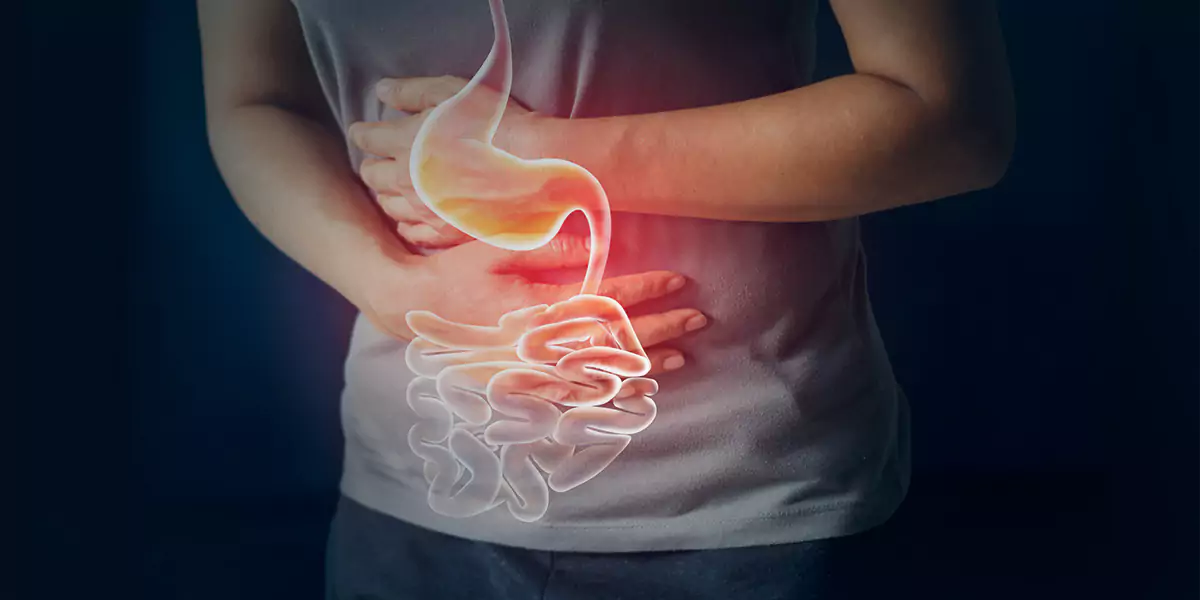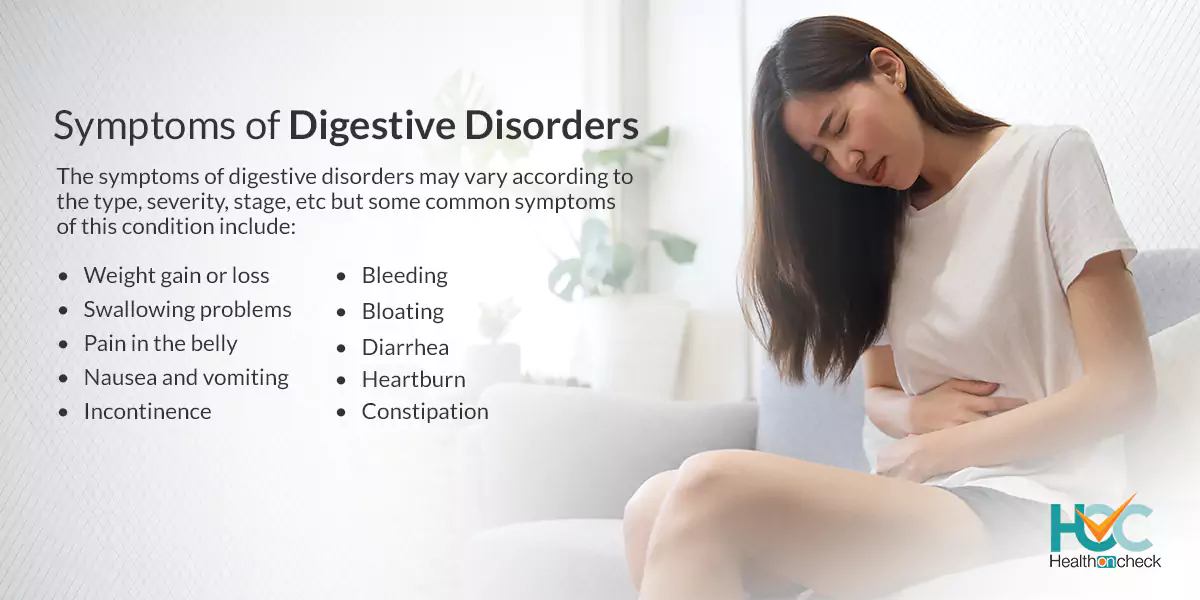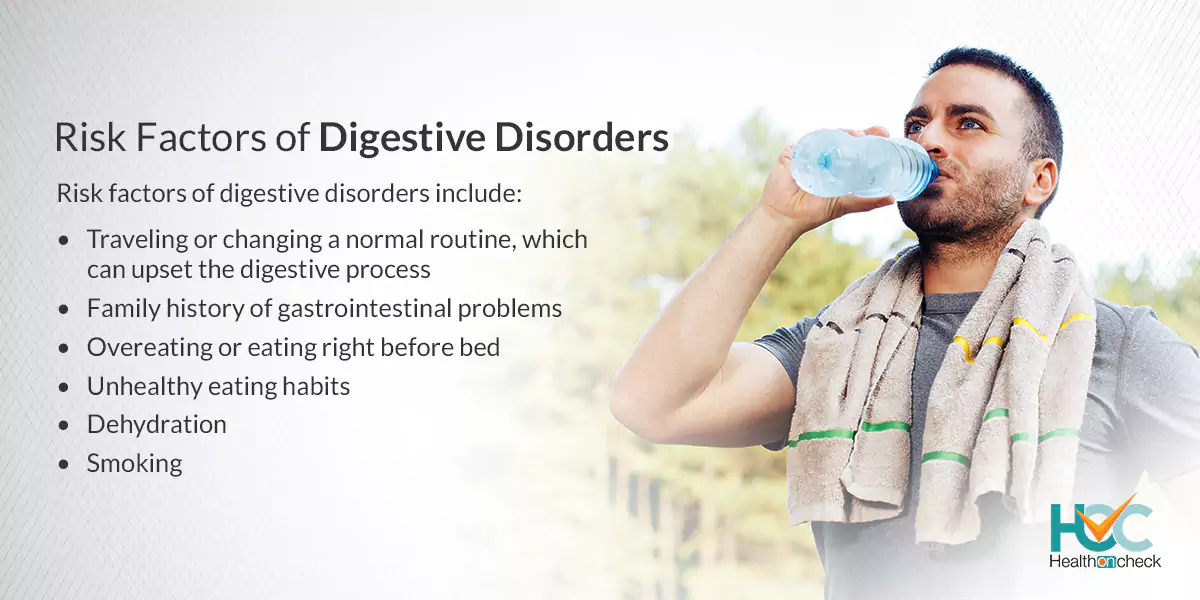All about Digestive Disorders?

What are Digestive Disorders?
Digestive diseases are diseases of the digestive tract, also known as the gastrointestinal (GI) tract. A digestive disease is any health disorder that happens in the digestive tract. These disorders may vary from mild to serious. Various organs of our body such as the esophagus, liver, stomach, small and large intestines, gallbladder, and pancreas come under the gastrointestinal (GI) tract. The digestive disorder is an umbrella term for a variety of diseases ranging from mild to severe. Common digestive disorders include gastroesophageal reflux disease, cancer, irritable bowel syndrome, lactose intolerance, and hiatal hernia. The most common signs and symptoms of digestive disorders are bleeding, bloating, constipation, diarrhea, heartburn, pain, nausea, and vomiting.
What are the Types of Digestive Disorders?
The most common types of digestive disorders are:
Gastrointestinal Reflux Disease (GERD): Gastroesophageal reflux disease (GERD) happens when stomach acid constantly flows back into your esophagus. Acid reflux can adversely affect the lining of your digestive system. Signs and symptoms of gastroesophageal reflux disease (GERD)include heartburn, chest pain, difficulty swallowing a feeling of a lump in your throat Regurgitation of food and liquids that taste sour
Celiac Disease: Celiac disease is also known as immune system disorder and it’s triggered by the consumption of foods containing gluten. Gluten is a type of protein found in barley, wheat, and rye and can cause problems in the small intestine that can lead to digestive problems and nutrient deficiencies because of a lack of proper nutrient absorption. Some disorders that come under digestive disorders are diarrhea, fatigue, weight loss, gas, abdominal pain, constipation, nausea, and vomiting.
Irritable Bowel Syndrome (IBS): IBS is a common digestive problem that affects the large intestine. The main cause of the disorder is still not well understood by researchers and some common symptoms of IBS are abdominal pain and cramping, bloating and gas, diarrhea, constipation, changes in the appearance of your bowels, and inconsistent bowel movement frequency.
Ulcerative Colitis: Ulcerative colitis is a chronic inflammatory bowel disease. In this condition, the abnormal reactions of the immune system lead to chronic inflammation and painful ulcers on the inner lining of the large intestine. It usually develops in people between the ages of 15 and 30 but can be diagnosed at any age.
Crohn’s Disease: Crohn’s Disease is another type of inflammatory bowel disease that leads to inflammation of the digestive tract. Inflammation caused by this disease can involve various sections of the digestive tract which spread into deeper layers of the bowel. Crohn’s disease can be very painful and sometimes lead to life-threatening complications.

What are the Symptoms of Digestive Disorders?
The symptoms of digestive disorders may vary according to the type, severity, stage, etc but some common symptoms of this condition include:
- Bleeding
- Bloating
- Constipation
- Diarrhea
- Heartburn
- Incontinence
- Nausea and vomiting
- Pain in the belly
- wallowing problems
- Weight gain or loss
What are the Causes of Digestive Disorders?
The main causes of digestive disorders include:
- Eating a low-fiber diet.
- Not doing enough physical activity.
- Taking certain medicines, like antacids, antidepressants, iron supplements, and narcotics
- Eating dairy products in large amounts.
- Stress
- Controlling the urge to have a bowel movement, mostly because of hemorrhoids.
- Overusing anti-diarrheal medications that weaken the bowel muscle movements called motility over some time.
- Taking antacid medicines that contain calcium or aluminum.
- Taking certain medicines like antidepressants, iron pills, and strong pain medicines such as narcotics
- Pregnancy

What are the Risk Factors for Digestive Disorders?
Risk factors of digestive disorders include:
- Being overweight or obese can put excess pressure on abdominal organs and tissues. This increases the risk of problems, such as GERD and hemorrhoids.
- Family history of gastrointestinal problems
- Smoking
- Dehydration
- Unhealthy eating habits
- Traveling or changing a normal routine, which can upset the digestive process
- Overeating or eating right before bed.
What are the Complications of Digestive Disorders?
The complications of digestive disorders are based on the underlying cause. The risk and seriousness of the complications vary with the condition. Chronic digestive diseases, like Crohn’s disease and ulcerative colitis, can lead to a few severe complications. But even temporary digestive disorders can make life miserable.
Digestive disorders may lead to both mild and serious complications. Mild complications include problems like diarrhea, constipation, weight gain or loss, heartburn irritable bowel syndrome, rectal bleeding, fever, etc and serious complications include the failure to grow (children), colitis, rectum bleeding, and even cancer especially colon cancer.
How Digestive Disorders are Diagnosed?
Digestive disorders can be diagnosed through various tests such as:
Calprotectin test: In this test, a stool sample is taken and sent to a lab for testing where they will examine the levels of Calprotectin. It is a protein that is found in the white blood cells has strong antibacterial properties and is very important for the functioning of our immune response.
Occult blood test: In this fecal test, patients have to submit a stool sample to check if there is any blood present. This test is done to examine whether there is bleeding in the GI tract, which may suggest bowel cancer and polyps in the rectum or colon.
Breath Test: If your doctor doubts that you are suffering from the infection H. pylori, a bacterium that infects the stomach that causes ulcers, they prescribe you a breath test. Patients prescribed for this test will have to abstain from eating shortly before the test. During the test, the patient needs to take a small capsule with a chemical called C13-urea inside. If H. pylori are there in the stomach, it will react with this chemical and produce gases that are detected in the breath.
Another breath test called the hydrogen breath test is done to check if you have lactose intolerance and small intestinal bacterial overgrowth (SIBO). Both tests need the patient to fast for 14 hours. In a test for lactose intolerance, a drink with a high-lactose content is given to the patients, and asked to breathe into a device at intervals for around 2 hours. High amounts of hydrogen can indicate undigested sugars and as such, lactose intolerance.
Living with Digestive Disorders
If you are suffering from any kind of digestive disorder then it may affect your daily life and the symptoms may vary from mild to severe. Mild complications can be treated with some easy treatments and preventive measures but severe complications like cancer and colitis need long-term treatments. It’s always better to prevent digestive disorders by leading a healthy living habits. Also, there are medications available that are helpful to improve digestion problems and some dietary guidelines that might also help.
Whom to Consult?
If you are experiencing symptoms of any digestive system disease or facing irregularities with your digestive tract, it’s always better to consult your doctor. Your doctor may refer you to a gastrointestinal specialist who can help you to answer your queries you may have about the health of your digestive system. If you are diagnosed with a digestive disorder, and its potential complications the gastrointestinal specialist will advise you to go for adequate treatment to cure them. Also, examine what to look for when problems are developing. Then you can identify the conditions early and seek the required treatment—and relief from the symptoms.




